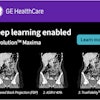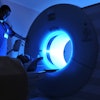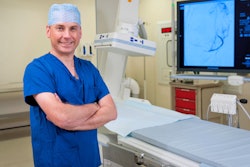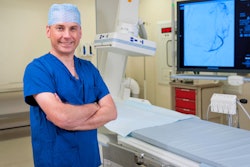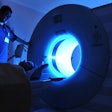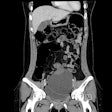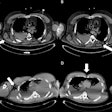A year or so ago, I was ill. It turned out not gravely, but enough to keep me off work for several months. After an initial and shocking diagnosis, some surgery and its embarrassing aftermath and recovery, and huge support from family, friends, colleagues, clinical staff in Leeds, and Maggie's Centre, I started to feel both physically and psychologically back to normal.
After six awful weeks, I thought I was well enough to get back to work, though there was still some treatment to get through and the advice I received was that I should not (i.e., must not!) go back to work until all my treatment was complete. This advice was correct, and it was delivered kindly and was taken, albeit grudgingly.
So late in 2023, I found myself at home, not working for the first time in years, and wondering what to do, because suddenly not only had I (temporarily) lost my work but I'd also lost my identity. If I was not working as a doctor, an interventional radiologist, a medical leader, and all the other professional roles I had cultivated so carefully in my work over the years, what was I? What was I for?
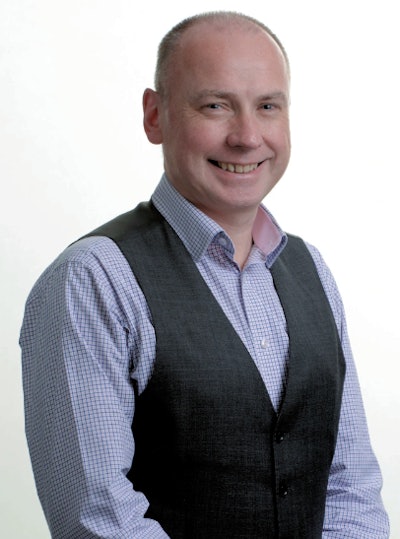 Dr. Chris Hammond from Leeds, U.K.
Dr. Chris Hammond from Leeds, U.K.
Medical identity is ingrained into the stories we tell ourselves as professionals. It's there in literature, drama, art, and popular culture. It's about the competition for access to a medical career, the sacrifices we make, the hours we work, the lives we affect. The narrative is that these experiences are qualitatively different from the experiences of other professionals. Any divergence from the stereotype of heroic medical figures going the extra mile for their patients is jarring. At its extreme, it can be almost indistinguishable from parody.
Is this justified? People employed in healthcare are hugely and uniquely privileged. We share intimate moments in our patients' lives, from birth to death, before and after. We experience things no one else does: the exquisite filigree of capillaries on the surface of a pulsing human brain; the knowledge of patients' future before they themselves know, determined in the greyscale of a scan or the banal data of a test result; the attention to private confidences, fears, triumphs, and insecurities. It's in the role distinction that allows us to assault, probe, and pry into the lives and bodies of our patients in ways that would result in prosecution for others.
But in many ways, we are no different from other employees and professionals who contribute to society. I know many nonmedical people who also competed hard to get where they are, who work much more than their contracted hours, and who care deeply about what they do.
Why are there not such strong identities associated with (for example) teachers, educating and enlightening generations of schoolchildren; entrepreneurs, providing jobs and opportunity; lawyers, navigating people through statute and caselaw; actors, entertaining tens of thousands over a career; and politicians, struggling to lead in the face of conflict? Comparisons of added value are destructive and obviously pointless, but there seems to be something in medical professional identification that is seen -- and sees itself -- as qualitatively different.
"I'm a doctor and I want my sausages"
Some might justifiably scoff at this pretense, at the implied self-importance, at the hubris. This is why we laugh at the character of Dr. Price in the BBC TV comedy classic Fawlty Towers (see YouTube video clip) when he demands his breakfast just because he's medically qualified with the non sequitur: "I'm a doctor, I'm a doctor and I want my sausages."
But while Dr. Price is a pompous ass, I think most doctors internalize their profession to some extent. We rarely describe our employment as "a job." It's "a vocation" or "a calling," with all the baggage that goes with it. Many years ago, during some resilience tuition close to the end of my radiology training, I (with hindsight, embarrassingly) admonished the facilitator for suggesting medicine was a career like any other. No, I told her: It's part of me, it's who I am.
So what? Does it matter what we tell ourselves? Who cares? In many ways, other than making us boring dinner party guests and drinking companions, it doesn't. In other ways, it matters hugely.
Managing change in any organization usually involves developing awareness and urgency around the need for change and building a 'core coalition' of people to begin to deliver it. Change also involves ending, losing, and letting go. Where people are invested personally in a project or service, challenge to that service (whether internal or external) can result in a grief reaction, beginning with denial and anger. This is amplified when the service subject to the proposed change is enmeshed with professional and personal identity. The (flawed) logic sees change as a threat, not only to professional practice but also to who you are. Change becomes personal and therefore more challenging to manage and deliver.
Some examples:
-- Pooled waiting lists challenge the assumption of surgeons that only they are capable of operating on their patients.
-- Advanced practice and physician associates challenge the identity that some jobs can only be done by medically qualified people.
-- Checklists and other initiatives to flatten hierarchy and improve safety challenge the identity of doctors as the primary source of organizational clinical accountability.
These operational and governance issues are complex enough without identity complicating them further.
Much of change management (and NHS England's The Change Model Guide) is focused on understanding and articulating high-order aims to identify commonalities in purpose and to co-create solutions, but even when aims are agreed, identity can confuse the solutions proposed.
No one would argue with the statement "Patients should not wait a long time for their surgery." But if the surgeon frames a query about operating room efficiency as identity ("I am a slow surgeon," or worse, "They say I'm a slow surgeon."), solutions become so much harder to enact. Opportunity is perceived as a threat and self-interested or self-preserving responses, disengagement, and even conflict are more likely. Progress is slowed. One of the challenges of leadership in healthcare is harnessing an overarching passion for improving patient care while still attending to the beliefs of those whose day-to-day work will be affected.
Identity is also why some doctors take complaints, criticism, and inevitable errors so personally (see my December 2021 column). A criticism about who you are is bound to cut more deeply than one about a service to which you contribute, and it is more likely to elicit a defensive response than productive inquiry and exploration of the cause and effort to improve.
Medical identity matters
So medical identity matters. At a personal level, it matters because the one certainty of a career in medicine is that it will end: what does that leave you with if your identity is your work? At an organizational level, it can hinder progress. So pay attention to your identity: Medicine is (just) a hugely fulfilling, privileged, and important job that done well can deeply affect the lives of many people. But when you disappear down its rabbit hole too far, when your job becomes who you are, you've got a problem.
I've been slowly realigning my identity away from my assertion 20 years ago that my job is who I am. I'm also a father, husband, son, friend, cook, host, occasional writer, and enthusiastic (but average) cyclist. One of the few good things to come out of my illness was to accelerate my preparation for the day when I must let go permanently that part of my identity that says I am a doctor.
Dr. Chris Hammond is a consultant vascular radiologist and clinical director for radiology at Leeds Teaching Hospitals NHS Trust, Leeds, U.K.
The comments and observations expressed herein do not necessarily reflect the opinions of AuntMinnieEurope.com, nor should they be construed as an endorsement or admonishment of any particular vendor, analyst, industry consultant, or consulting group.




